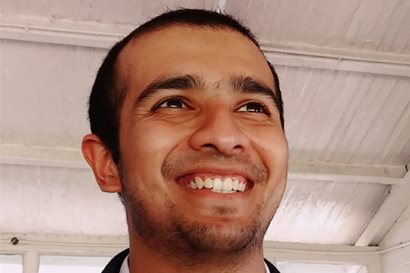
November 9, 2020, by Andrew Edwards (Ed)
How do plant roots respond to higher temperatures? – An interview with Aneesh Lale
Aneesh Lale is a PhD student on the Palaeobenchmarking Resilient Agricultural Systems (PalaeoRAS) project
Why did you decide to do a PhD? What were you doing before?
My father, having never found the time to complete his post-graduation, always encouraged me to learn as much as possible. My inquisitive nature, in addition to ample support from my parents, made a PhD a good choice for me.
While working in the R&D department of a vaccine manufacturing company after my Masters, I realized that I needed to understand the scientific process better before I could apply it in my career. That is when I decided to pursue a PhD.
Why did you choose this particular PhD project?
Although not as glamorous as other streams of molecular biology, plant biology has its charm and it slowly became my favourite. The resilience and adaptability of plants always amazes me and I chose my current PhD project to better understand this at a molecular level.

Photograph by Zoe Wilson
Tell us about your research. Why is it important?
I am trying to figure out how the roots of plants respond to higher temperatures. Since roots absorb nutrients and water from the soil, any detrimental effect on them translates to an overall negative impact on the plant. With increasing land and sea temperatures due to global warming, it is essential to study the effects of heat on our food crops. This would make our future more secure.
How do you explain your research to ordinary people?
Since I work on crops, it is usually quite easy for people to relate to my research. I explain my research in terms of ‘improvement of food crops to increase yields even under harsh environmental conditions’. That is well understood and appreciated.
How is your first year going? Any highlights or successes?
My first year has contained a lot of hiccups to be honest. I had to postpone my start date from Oct 2019 to Feb 2020 due to problems with official documentation. Then, a month and a half into working in the laboratory, the university shut down due to the pandemic. I did get to attend a Rice Research Conference in Sheffield before lockdown so that would be the highlight of my year so far.
Has undertaking a PhD been different from other degrees you have done?
The freedom from a set course structure and the responsibility that accompanies a PhD is what I feel is different about this PhD.
What have you learned in your first PhD year?
I have started performing bioinformatics analysis on large sets of data. I still have a long way to go and I will learn as I go forward.
On a personal note, I moved to the UK from India for my PhD; my housekeeping and cooking skills have drastically improved since I left home!
How do you cope with the pressure of doing a PhD?
I do not have many friends here yet since it has only been a few months since I have moved. My housemates and colleagues are all great and I talk to them often when I am tired or lonely. My PhD guide is also very friendly and approachable and makes a point of making sure I am okay. I like pets and gardening but I do not have the resources to enjoy these things here yet. Fingers crossed for the future!
No comments yet, fill out a comment to be the first

Leave a Reply